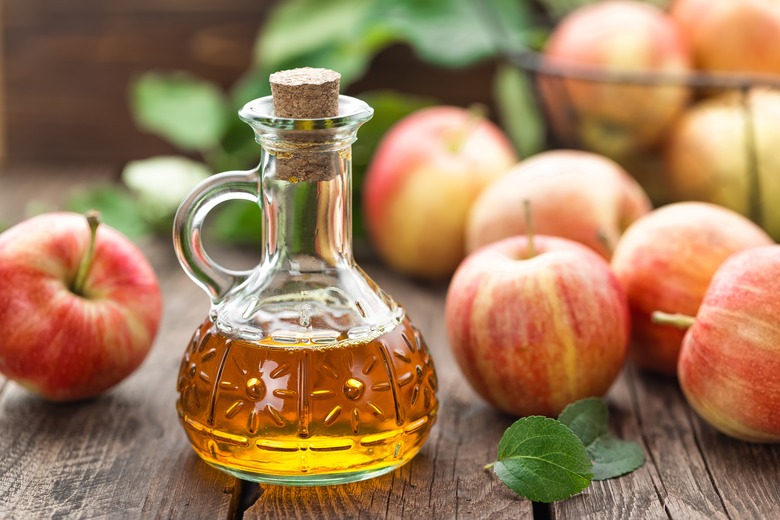If You Dilute Vinegar, How Will It Affect The pH Value?
When an acid like vinegar is diluted with water, the concentration of free-floating hydrogen ions decreases. This results in a higher pH value. On the pH scale, which runs from 0 to 14, the pH level of vinegar is between 2 and 3. Pure or distilled water has a pH level of 7, which means it is neutral. A substance with a pH level below 7 is acidic, and a substance with a pH level above 7 is alkaline.
TL;DR (Too Long; Didn't Read)
Diluting vinegar with water increases its pH value, because vinegar is an acid and water has a higher pH level. However, adding water to vinegar can never turn vinegar into an alkaline, because water has a neutral pH.
Adding Water to Vinegar
Adding Water to Vinegar
Vinegar is a diluted form of acetic acid, with acetic acid making up 4 percent to 6 percent of the vinegar's content, depending on the brand and type of vinegar. When water is added to vinegar, the vinegar's acidity decreases, which results in a higher number on the pH scale. The more water is added, the more the pH level will increase. However, diluting vinegar with water can never make it alkaline, because water itself is not alkaline; the pH of the mixture can't be higher than the higher pH value of the two components.
Uses for Vinegar and Water
Uses for Vinegar and Water
One example of when you would mix vinegar and water is to make a multi-purpose home cleaning spray. In this case, if you add too much vinegar, you may want to dilute it until you get the vinegar/water ratio just right. Some tasks, such as cleaning stubborn mold and mildew, may require more vinegar than other tasks, like cleaning your kitchen worktops. Another use for vinegar and water mixture is pickling vegetables, where the widely accepted rule of thumb is that the vinegar should be of at least 5 percent acidity (as in distilled white vinegar) and that the vinegar/water mixture should be at least 50 percent vinegar.
Neutralizing Vinegar
Neutralizing Vinegar
If you want to neutralize vinegar in a meal, try adding very small amounts of baking soda, stirring the food well before tasting it, and adding more if necessary. Because baking soda is alkaline, with a pH of about 8, it can help weaken the vinegar taste and may also be used to neutralize other acidic foods, such as cooked tomatoes. Baking soda can also be used to get rid of a strong vinegar smell (for example if you've been too heavy-handed with that home cleaning spray). Simply leave an open box of baking soda in the room with the smell and let it work its neutralizing magic.
Cite This Article
MLA
Gillespie, Claire. "If You Dilute Vinegar, How Will It Affect The pH Value?" sciencing.com, https://www.sciencing.com/dilute-vinegar-affect-ph-value-8702588/. 26 April 2018.
APA
Gillespie, Claire. (2018, April 26). If You Dilute Vinegar, How Will It Affect The pH Value?. sciencing.com. Retrieved from https://www.sciencing.com/dilute-vinegar-affect-ph-value-8702588/
Chicago
Gillespie, Claire. If You Dilute Vinegar, How Will It Affect The pH Value? last modified March 24, 2022. https://www.sciencing.com/dilute-vinegar-affect-ph-value-8702588/
